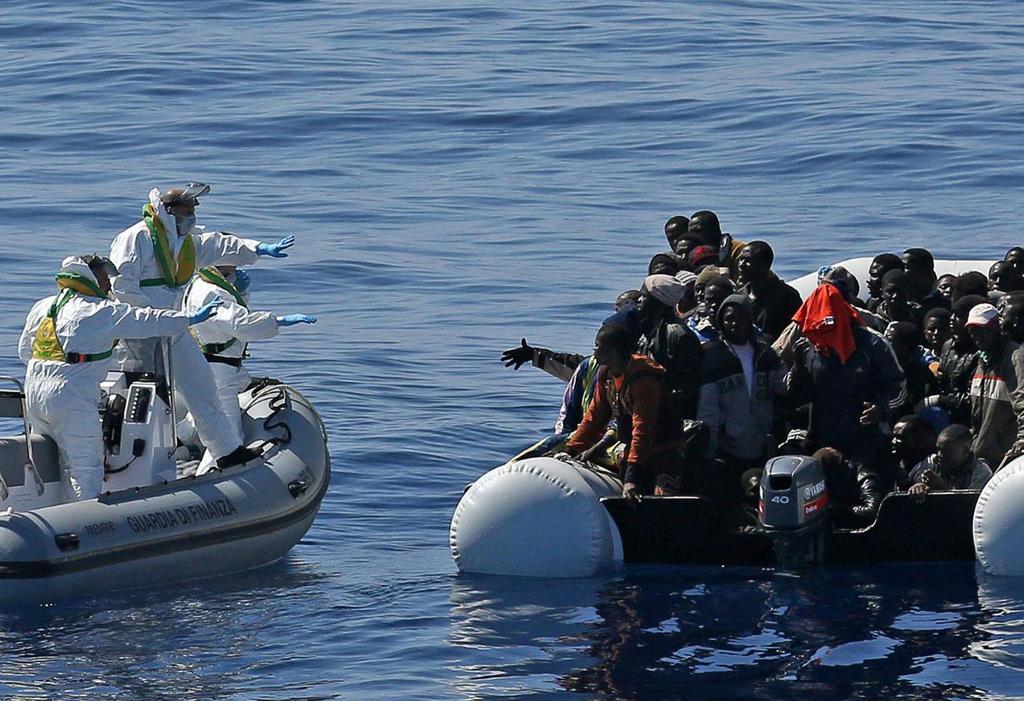
‘No quick fix’ for Mediterranean boat tragedies

Swiss press see Thursday’s decision by European Union leaders to devote €9 million (CHF9.33 million) per month to rescuing refugees in the Mediterranean Sea as falling short of what is needed.
“The strategy remains minimalist”, said the French-language newspaper 24 Heures.
In the wake of the boat tragedies on Sunday in which almost 900 refugees drowned, leaders at the summit promised increased efforts to rescue people from overcrowded and foundering boats. But the summit’s chairman, European Council President Donald Tusk, warned that there would be no quick fix for problems.
“European policy has failed, and the mass grave of the Mediterranean will devour even more people. That was the sad conclusion after the EU summit in Brussels yesterday,” according to the Neue Luzerner Zeitung newspaper. “In spite of a show of concern, there are no results that will largely prevent the deaths.”
In monetary terms, the group pledged to triple the amount currently being spent. But essentially that meant restoring funding to the previous year’s level. Italy’s Mare Nostrum mission, which had rescued 100,000 people the previous year, had been replaced by the scaled-back Triton programme, limited to Italian waters.
One of the proposals reported after Thursday’s meeting was to “undertake systematic efforts to identify, capture and destroy vessels before they are used by traffickers”. But without a formal government in Libya this could be difficult to organise, the Reuters news agency pointed out.
The mandate “remains the protection of maritime borders of the Mediterranean EU states and not helping boats in distress. Repression takes precedence again over sea rescue…,” said 24 Heures.
Several countries, including Britain, Germany, France, Belgium and Sweden, pledged to send boats to help with rescue missions. British Prime Minister David Cameron, who is running for re-election in a vote to take place on May 7, promised the HMS Bulwark, the Royal Navy’s helicopter-carrying flagship, to help with rescue operations, saying that Britain has the means to save lives at sea.
The daily newspaper Tages-Anzeiger commented: “The British Prime Minister is at home in the last stretches of the election campaign. His message in Brussels was intended as a powerful signal for undecided voters.”
A difficult choice
The dilemma faced by the countries of Europe is how to provide support for the wave of refugees fleeing horrendous conditions in North Africa, yet avoid “burdening” their own countries with increasing numbers of asylum-seekers, who often face rejection by communities asked to take them in.
“For once, Switzerland is clearly a part of the continent,” said an editorial in the Tages-Anzeiger. “As a landlocked country it’s not the first destination for smugglers’ boats, and [as a non-EU country] it was absent from yesterday’s EU emergency summit. Nevertheless, it has a duty.”
Every month people arrive in Switzerland seeking asylum after arriving by boat from countries like Syria, Mali and Eritrea, said the editorial. “It is right and just” that Switzerland share the costs of rebuilding the sea rescue programme.
On Thursday, a Swiss parliamentary commission held a long debate over the recent migrant deaths in the Mediterranean. The commission voiced its support of Justice Minister Simonetta Sommaruga, who would like to extend the rescue perimeter and increase Switzerland’s contribution to the Triton rescue missions. The commission, however, rejected a motion proposed by the left calling for the creation of a humanitarian “bridge” to allow refugees to get to Europe safely without putting additional burdens on Greece and Italy.
The motion had also called for the creation of a crisis cell, and for asylum seekers to again file requests in Swiss embassies abroad, which were also turned down.
The larger problem
An opinion piece in the French-language L’Express/L’Impartial newspapers pointed the finger of blame for part of the Mediterranean migrant disaster at western powers like France, which pushed to intervene militarily in Libya in 2011.
“The massive bombing led to the elimination of Moammar Gaddafi, but it also ripped Libya apart, ruined infrastructure, displaced thousands of refugees and handed the country over to numerous clans, warlords, and all kinds of criminal, political and religious groups.”
According to the Tages-Anzeiger, opening a legal route for asylum-seekers and increasing the contingents of refugees are both politically unpopular approaches in Switzerland, and the common belief is that “doing more is not possible”. But in fact, said the newspaper, “that underestimates the people. In spite of the fear of a wave of foreigners, no one wants to see children dying in the ocean. When the alternative is drowning, quite a lot should be possible.”
With input from Simon Bradley

In compliance with the JTI standards
More: SWI swissinfo.ch certified by the Journalism Trust Initiative


























You can find an overview of ongoing debates with our journalists here . Please join us!
If you want to start a conversation about a topic raised in this article or want to report factual errors, email us at english@swissinfo.ch.